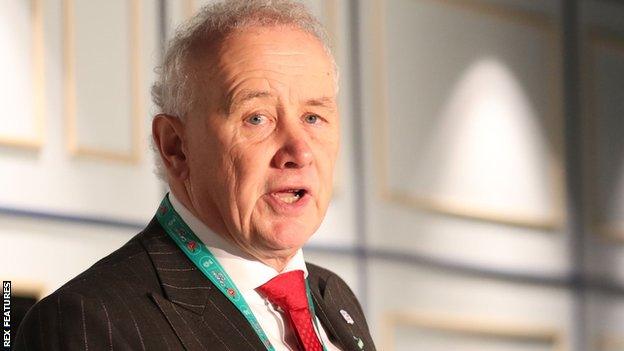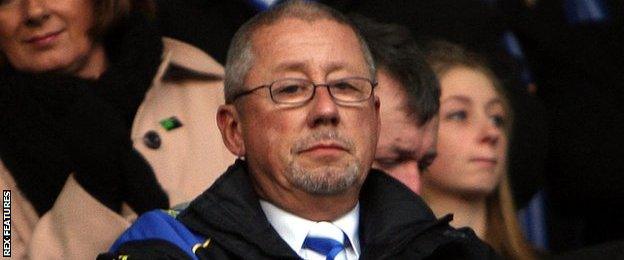EFL club officials on the challenges posed by the coronavirus pandemic
- Published

Rick Parry is former chief executive of the Premier League and Liverpool FC
The coronavirus pandemic has left the English Football League's competitions in limbo and placed question marks over the futures of around 1,400 out-of-contract players after July.
Rick Parry, the chairman of the EFL, says the world's oldest football competition needs a "proper reset" after Covid-19 left clubs facing a "£200m hole" in their finances by September.
There are talks of plans to restart competitions that were paused in March, but there has been no agreement among officials, clubs, managers, players or even team doctors on when that will happen and how it will look.
When Parry faced the Commons Digital, Culture, Media and Sport committee on Tuesday to give evidence about the the impact of coronavirus on the sport, he grimly stated it was "difficult to answer" how many clubs might go out of business.
With an EFL board meeting to be held on Wednesday to continue discussions about what comes next, BBC Sport spoke to a number of clubs about the challenges ahead.
Can the season be finished?
Parry said on Tuesday the season needs to be over by 31 July.
After that, issues over player contracts - with existing and future employers - become a legal minefield. Then there are around 1,400 players who will be out of contract in the summer.
In the Premier League there is talk of using neutral venues to conclude the season, but with the three leagues and 71 clubs below also intending to get the 2019-20 campaign done, the logistics are clearly more difficult.
Dave Boddy, chief executive of League One leaders Coventry City, says players would need to return to training imminently for hopes of finishing the season in 56 days from 6 June to be realised.
"We believe we need at least three weeks to get the players back up to the fitness levels they were at before the lockdown," Boddy told BBC Radio 5 Live.
"We've always supported the premise of finishing the season for sporting integrity, but as every day goes by I think it's fair to say it's looking unlikely.
"I would believe it's getting around to the middle of next week (that players will need to return), whether it's Wednesday or Thursday, or Friday, I would say that's the tipping point really.
"A lot will depend on prime minister Boris Johnson's announcement on Sunday of easing lockdowns and what we can and can't do."
EFL club doctors, who are helping guide decisions, are split about how any restart would happen.
Boddy said an unprecedented level of testing for coronavirus - at a time when frontline medical services are still in critical need of it themselves as they deal with the public health crisis - would be required to make the sport safe to resume.
"One of the main problems we've got is when players do come back into training I think testing is going to be key," Boddy said.
"We believe that to effectively test players they would need to be tested every day on arrival to the training ground.
"It's a contact sport, you cannot isolate people. Initially you can do running separately, but to get them back to the levels they need to be for match conditions there will be contact and we believe that testing will be key to that.
"Unless we can put testing in place I don't think it can happen."
Funding football without fans
Without the broadcast millions that Premier League sides have, clubs in the EFL are largely reliant on having football fans in the stands to generate income.
Rochdale chief executive David Bottomley has previously spoken about the "disastrous" impact of the pandemic on the EFL and now the League One club are bracing themselves for months of financial turmoil.
"A club like this is planning very carefully now to not have any income potentially coming in until the early months of 2021 because we think that football alongside theatres, cinemas, restaurants and pubs will be the last places the government unlock from social distancing," Bottomley told BBC Sport.
"And so we are planning very carefully now to make sure that we get to a point next year that we are still in business.
"We celebrate our 100th anniversary as a Football League club on 21 August 2021 and we want to be there as an EFL member club, and we are doing everything we possibly can to make sure that happens."
Bottomley said the reality of the football business, one where most money made goes to player wages, means there is no easy way to deal with the economic strains of inactivity.
"In an ideal world what we would do now is mothball the club and reopen it in a year's time when the world may be back to some form of normality with people paying to get into football grounds," he said. "But you can't just do that.
"People need to be paid and the biggest cost base in any football club is the playing staff."
'Football has been a runaway train'

Gillingham were in the fourth tier of English football when Paul Scally bought the club in 1995
The financial demise of one EFL club, Bury, at the start of the season prompted a government inquest, an independent league investigation and endless debate.
Now with the 71 remaining clubs trying to avoid ruin, attention is being turned to what measures need to be taken.
Gillingham chairman Paul Scally says that many football clubs were already "overstretched" and "feeling the pain" before the Covid-19 pandemic took effect.
"Football has been a runaway train ready to go off a cliff," the League One club's long-serving owner told BBC Radio Kent.
"Maybe this pandemic has unwittingly stopped it in its tracks."
Scally, 65, is a big supporter of salary-capping, in the hope that clubs will in the future operate "on a more level playing field".
"Wage caps shouldn't be a necessity if any responsible owner runs their business responsibly," he added. "But, of course, that's not been the case."
Is a salary cap the answer?
Parachute payments for clubs relegated from the Premier League are "an evil" that Parry highlighted on Tuesday, while Scally says there is pressing need for Championship clubs - a majority of which spend more money on wages than they are able to generate yearly - to limit spending.
"Everyone in football, and specifically owners in the Championship, realises that the model they're running is unsustainable," Scally said.
"But, if enforced and policed properly, a salary cap would force those owners, mostly in the Championship, the ones that are prepared to spend £40-50m over on wages, to operate on a more level playing field.
"Put in a £15m maximum salary cap and they won't be able to go above it.
"The Championship has been a runaway train ready to hit the buffers for the last five years, certainly the last two years. In Leagues One and Two we've been trying to hang onto their coat tails and that's been an impossible task.
"Now is the time to look at the business and, for the sake of football going forward, we have to have regulations to stop people doing this.
"There are one or two clubs who have overstretched and are now feeling the pain. But the pandemic hasn't caused that problem. It's just highlighted it.
"The higher the costs, the bigger the losses. And there's a few who have been trying to feed the golden goose and have overspent, with higher wage bills than they should have.
"If it wasn't for the government's furlough scheme, many would not have been able to meet their April or May wage bill."
A need for proper housekeeping
Already there are advanced talks of spending caps on salaries in both League One and League Two, according to Grimsby chairman Philip Day.
"Earlier in the year League One and League Two clubs said 'we've got to do something about the financial situation at our level of football, we can't continue the way we've been going', so there is a paper as to financial viability of clubs, including limiting squad sizes and limiting a salary cap within League One and League Two," Day told BBC Radio Humberside.
"This isn't a salary cap for individual players, it's a club salary cap, and the figure that's been suggested for League Two is £1.25m and how clubs spend that between players is up to them.
"We've got to get some financial stability back into football and the only way we'll do that is by housekeeping properly.
"We've always done that at Grimsby. We have always lived within our means, always had a healthy balance of cash at the end of each season. We haven't got into financial difficulties and I pay credit to John Fenty (majority shareholder of the club) for that and his financial planning."